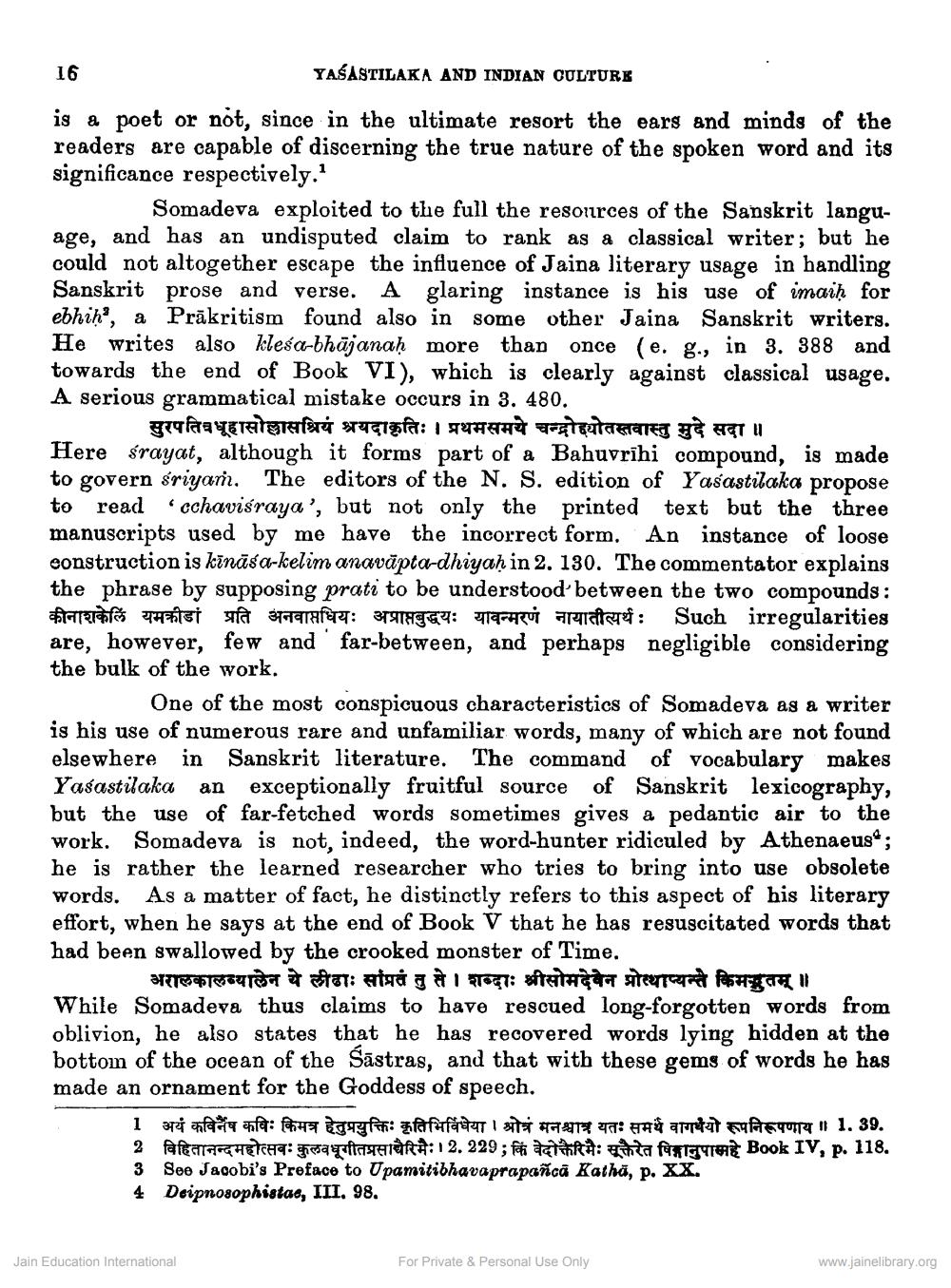________________
16
YASASTILAKA AND INDIAN CULTURE
is a poet or not, since in the ultimate resort the ears and minds of the readers are capable of discerning the true nature of the spoken word and its significance respectively.1
Somadeva exploited to the full the resources of the Sanskrit language, and has an undisputed claim to rank as a classical writer; but he could not altogether escape the influence of Jaina literary usage in handling Sanskrit prose and verse. A glaring instance is his use of imaiḥ for ebhiḥ, a Prakritism found also in some other Jaina Sanskrit writers. He writes also klesa-bhajanaḥ more than once (e. g., in 3. 388 and towards the end of Book VI), which is clearly against classical usage. A serious grammatical mistake occurs in 3. 480.
सुरपतिचधूहासोल्लासश्रियं श्रयदाकृतिः । प्रथमसमये चन्द्रोहयोतस्तवास्तु मुद्दे सदा ॥
Here srayat, although it forms part of a Bahuvrihi compound, is made to govern sriyam. The editors of the N. S. edition of Yasastilaka propose to read 'cchaviśraya', but not only the printed text but the three manuscripts used by me have the incorrect form. An instance of loose construction is kīnāsa-kelim anavapta-dhiyaḥ in 2. 130. The commentator explains the phrase by supposing prati to be understood between the two compounds: कीनाशकेलिं यमक्रीडां प्रति अनवाप्तधियः अप्राप्तबुद्धयः यावन्मरणं नायातीत्यर्थ: Such irregularities are, however, few and far-between, and perhaps negligible considering the bulk of the work.
One of the most conspicuous characteristics of Somadeva as a writer is his use of numerous rare and unfamiliar words, many of which are not found elsewhere in Sanskrit literature. The command of vocabulary makes Yasastilaka an exceptionally fruitful source of Sanskrit lexicography, but the use of far-fetched words sometimes gives a pedantic air to the work. Somadeva is not, indeed, the word-hunter ridiculed by Athenaeus*; he is rather the learned researcher who tries to bring into use obsolete words. As a matter of fact, he distinctly refers to this aspect of his literary effort, when he says at the end of Book V that he has resuscitated words that had been swallowed by the crooked monster of Time.
अलकालग्यालेन ये लीढाः सांप्रतं तु से । शब्दाः श्रीसोमदेवेन प्रोस्थाप्यन्ते किमद्भुतम् ॥
While Somadeva thus claims to have rescued long-forgotten words from oblivion, he also states that he has recovered words lying hidden at the bottom of the ocean of the Sastras, and that with these gems of words he has made an ornament for the Goddess of speech.
1 अयं कविनैष कविः किमत्र हेतुप्रयुक्तिः कृतिभिर्विधेया । श्रोत्रं मनश्चात्र यतः समर्थ वागर्थयो रूपनिरूपणाय ॥ 1. 39. 2 विहितानन्दमहोत्सवः कुलवधूगीतप्रसाद्यैरिमैः । 2. 229 ; किं वेदोक्तैरिमैः सूक्तैरेत षिङ्गानुपास्महे Book IV, p. 118. 3 See Jacobi's Preface to Upamitibhavaprapanca Katha, p. XX. 4 Deipnosophistae, III, 98.
Jain Education International
For Private & Personal Use Only
www.jainelibrary.org




